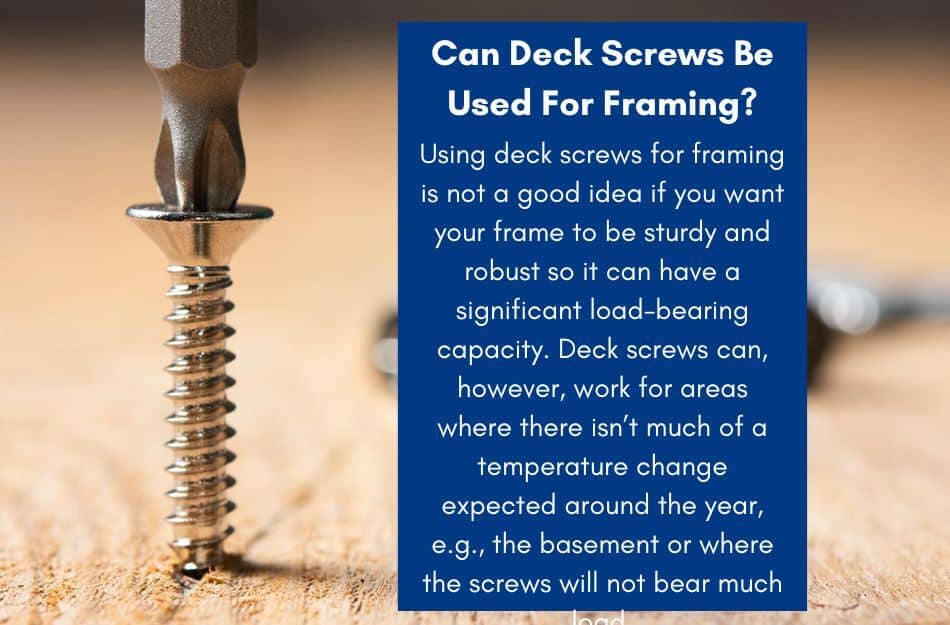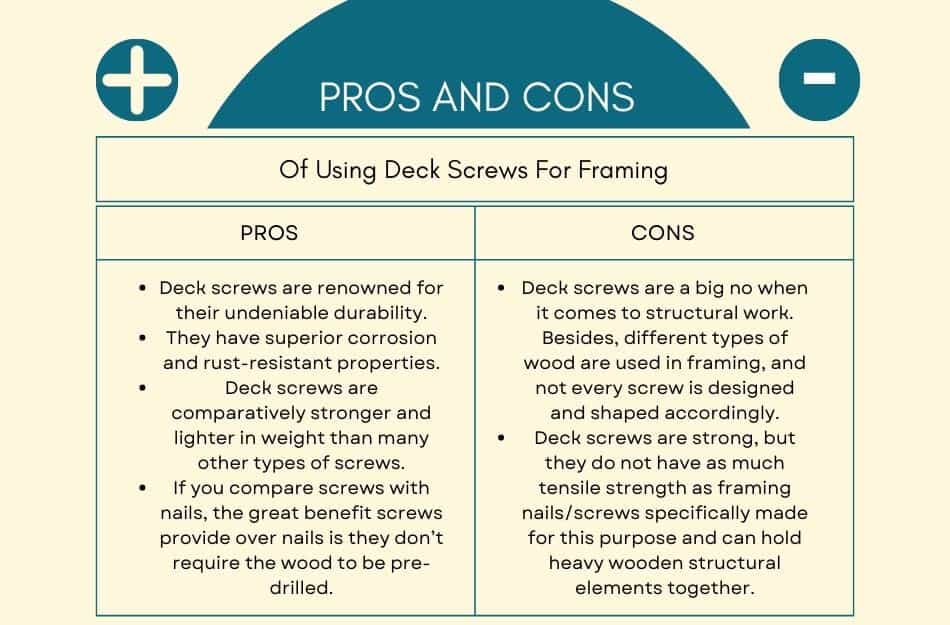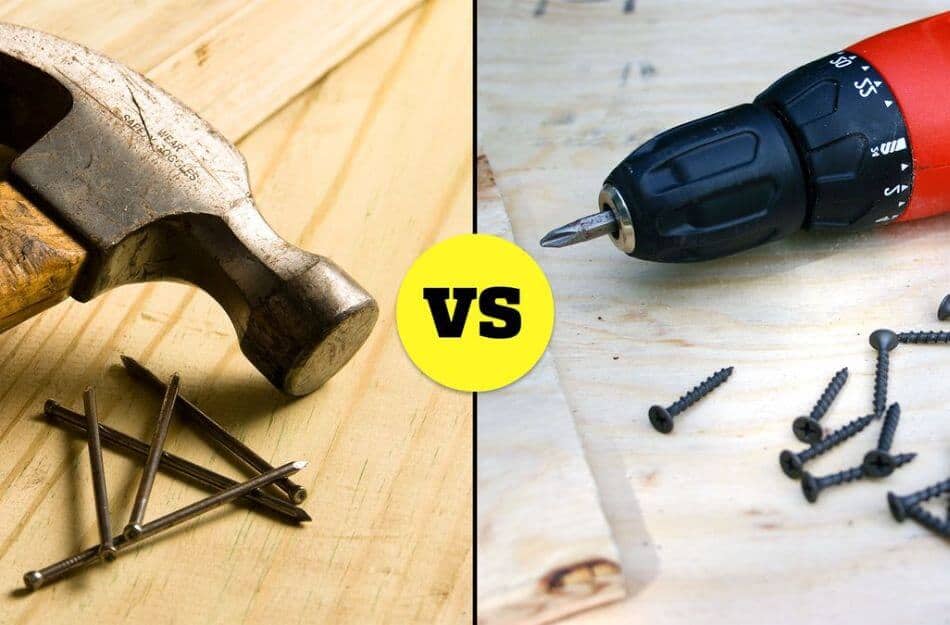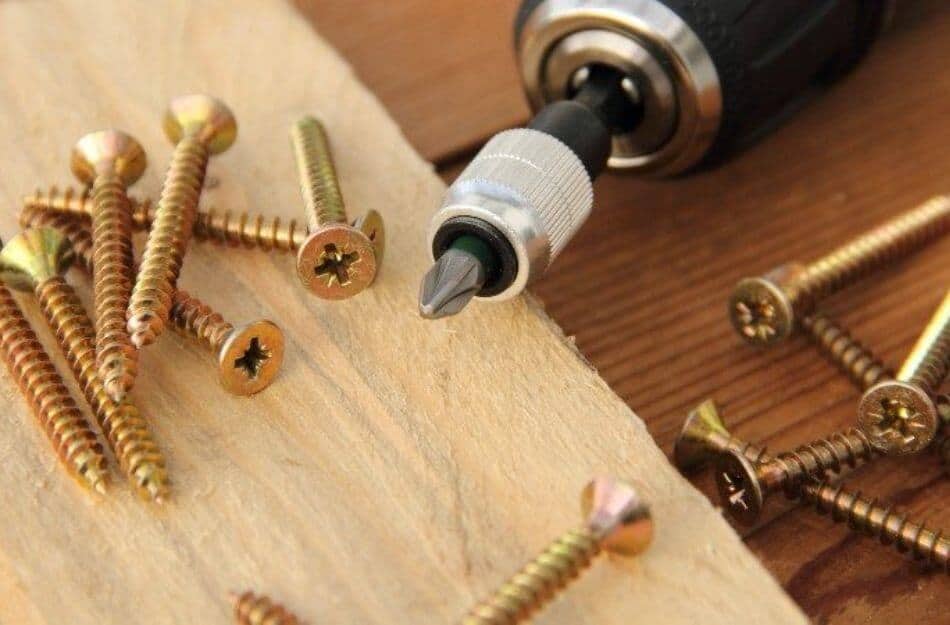Choosing the right screw for framing can always be confusing as there are loads of options in the market. A usual decision made by people is to use deck screws for framing.
Although it is not entirely wrong, it is not the best-suited option and can cause many problems over time.
Using deck screws for framing is not a good idea if you want your frame to be sturdy and robust so it can have a significant load-bearing capacity. Deck screws can, however, work for areas where there isn’t much of a temperature change expected around the year, e.g., the basement or where the screws will not bear much load.

You would be wondering, what to use if not deck screws? Stick along, and you’ll find all about decks, screws, and framing. Make sure you read until the end, as we have something special for you in the last section!
Table of Contents
Pros & Cons Of Using Deck Screws For Framing

It has been a never-ending debate whether one should use the same screws for framing as they are for the deck.
Some folks tend to favor the decision, while others call it utter foolishness. But today, we shall study in detail all the pros and cons of this decision.
Pros
Deck screws are renowned for their undeniable durability, making them a reasonable choice for outdoor and indoor structures.
They have superior corrosion and rust-resistant properties, making them an excellent choice for areas subject to weather corrosion.
Along with providing weather protection to your structure, they are also very beneficial regarding weight. Deck screws are comparatively stronger and lighter in weight than many other types of screws.
Besides, their robustness is almost unmatched at such weight and grade. In addition, deck screws have a considerable tensile strength ranging from 70-125 pounds depending on various factors such as:
- Length
- Type of Thread
- Insertion Technique
If you compare screws with nails, the great benefit screws provide over nails is they don’t require the wood to be pre-drilled. This is mainly because deck screws have a thread on their body, preventing the wood from getting split.
Moreover, temperature and humidity changes throughout the year can cause the wood and joints to swell up and exert extra pressure on the screws.
This often causes the screws to pop up and fall out due to the added tensile force. Hence, deck screws are used for outside balconies to counter this issue.
Keeping this in mind, you may be able to use deck screws from some types of framing, especially outdoors. Hence, deck screws are not as bad as everyone claims to be for framing.
Cons
There are, however, reasons why it is not recommended to use deck screws for framing. Let us discuss them in detail.
Firstly, you need to understand that deck screws are a big no when it comes to structural work. Besides, different types of wood are used in framing, and not every screw is designed and shaped accordingly.
You would surely want the structure/frame to be sturdy and reliable. If you rely on the one size fits all strategy, it won’t be long before you face serious inconveniences.
An example is when people use joist hangers, which are a great way to connect two wooden structures, but they use deck screws for fastening purposes.
This idea is foolish and risky, as deck screws are not meant to be used for structural purposes.
Secondly, deck screws are strong, but they do not have as much tensile strength as framing nails/screws specifically made for this purpose and can hold heavy wooden structural elements together.
Using deck screws and ignoring all the safety precautions can be extremely risky, expensive in constant repair, and can get you fined heavily if an inspector knows you are doing this.
It is a unified truth that nails have more sheer strength than screws. Hence, using nails for framing sounds more sensible when you think about it.
You often notice that nails are used for heavy structural framing mainly because they are strong enough to hold.
Using deck screws would be far more expensive as the screws cost more than nails, and you would constantly have to repair them as they can’t bear the load you expect them to.
Hence, it wouldn’t be very sensible to use deck screws for framing purposes.
What To Use For Framing?
There are certain types of screws and nails available in the market that are purpose-built for framing, for instance. 16d nails, #8-12 screws, and a lot more.
Firstly, you must understand that only framing nails and screws can be used for structural purposes. Any other type is not suited for this purpose. Any consequence you face by using other types of screws/nails shall be your responsibility.
Having that said, we have a variety of nails and screws that can be used for framing. The most recommended gauge for framing nails is 16d, and according to professionals, the optimum length starts at 3.5 inches. However, there are other types of nails available on the market as well that you can use:
- 16d common nails
- 16d sinker nails
- 8d nails
- 10d nails
When we look at screws for framing, we have a variety over there as well, but make sure that you only choose wood screws and strictly avoid any other type:
- 8 Screws
- 10 Screws
- 12 screws
Nails Vs. Screws: Which One Is The Best For Framing?

Long story short, if you want a permanent and sturdier solution, you should go for nails. However, if you want to be able to disassemble the structure you should opt for screws as they can be removed without damaging the wood.
Nails and screws are quite similar in functionality. Some nails, such as spiral shank nails, resemble screws, making them even more confusing. Choosing the right one between nails and screws for your framing purposes can be confusing.
While there is a mixed opinion on the internet, we will provide you with a detailed review of what factors you must consider when making this decision.
Size of Project
The scale of your project is the most important factor when deciding between nails and screws as it shall be the deciding factor to what you choose if you are looking forward to a greater project with structural needs such as the frame of a house, building staircases, etc.

You need to choose nails because they are much cheaper and generally stronger than screws. Suppose you are concerned about light woodwork, such as children’s furniture, cabinets, etc. In that case, you can move to screws without worrying about anything.
In addition, nails are better for joining as they can be flexible even under severe tensile force; however, your screws are most likely to snap when an uneven force is applied.
Temporary or Permanent
It is very important to understand that nails are meant to be permanent, while screws are made to allow the user to remove them upon will. Hence, if you are sure you will not have to remove them for a long time, you must go for nails without a doubt.
But, if you are unsure or your usage is temporary, or you want to be able to disassemble when you want to, your go-to solution must be framing screws.
The Material They Are Going In To
Nails and screws serve different purposes, and many grades are made for different uses and types of wood. They have different shapes and insertion techniques mainly because they are meant to be used for different purposes.
For instance, even if you use joist hangers, you can’t just savage your way through with anything you like. If you’re installing drywall or sub-flooring, screws are a better option as they will keep the structure tighter for a longer period.
If you’re laying down hardwood floorboards, nails are the preferred fasteners. Mainly because they don’t split the would-like screws; their heads do not mark the surface of the wood as screws would.
Hence, it is a must to identify the material and the shape of the items you want to use nails or screws on.
Budget of The Project
In some scenarios, the budget might be the most important deciding factor as it might make you compromise at places or even go overboard. Hence, you need to understand how to make the most of it.
A rule of thumb is that nails are much cheaper than screws, but as both are equally important and serve different purposes, try to balance your way through them.
Try to get common and spiral shank nails if you are short on budget, as they will cover almost all your needs.
Besides, they are the best in terms of versatility and durability, so you would be getting something worth your buck.
However, if you do not have any budget constraints, it is wise to filter out your requirements and get the job done accordingly. In such case, the abovementioned points will surely guide you to choosing the best option for your requirements.
Final Thoughts
We can summarize all this discussion to the verdict that deck screws are not the most suitable option for framing. If you want to hold together a frame, framing nails and screws are the best option to do so.
Recent Posts
Although deck sealing may not be at the top of your summer to-do list, you shouldn’t put off a task.One such deck that channels the opposite of the lively and enjoyable vibe you want from an...
Any home would benefit from having a deck because it adds more area for socializing, relaxing, and outside activities.Garden decking that has been properly polished can be elegant and lovely. It...
